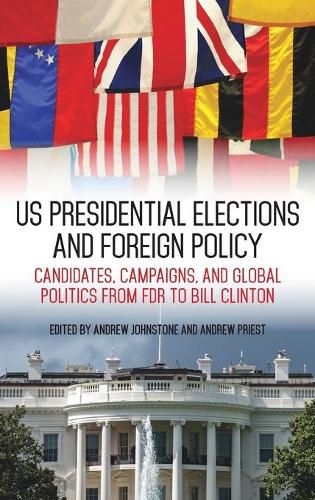Readings Newsletter
Become a Readings Member to make your shopping experience even easier.
Sign in or sign up for free!
You’re not far away from qualifying for FREE standard shipping within Australia
You’ve qualified for FREE standard shipping within Australia
The cart is loading…






This title is printed to order. This book may have been self-published. If so, we cannot guarantee the quality of the content. In the main most books will have gone through the editing process however some may not. We therefore suggest that you be aware of this before ordering this book. If in doubt check either the author or publisher’s details as we are unable to accept any returns unless they are faulty. Please contact us if you have any questions.
While domestic issues loom large in voters’ minds during American presidential elections, matters of foreign policy have consistently shaped candidates and their campaigns. From the start of World War II through the collapse of the Soviet Union, presidential hopefuls needed to be perceived as credible global leaders in order to win elections – regardless of the situation at home – and voter behavior depended heavily on whether the nation was at war or peace. Yet there is little written about the importance of foreign policy in US presidential elections or the impact of electoral issues on the formation of foreign policy. In US Presidential Elections and Foreign Policy, a team of international scholars examines how the relationship between foreign policy and electoral politics evolved through the latter half of the twentieth century. Covering all presidential elections from 1940 to 1992 – from debates over American entry into World War II to the aftermath of the Cold War – the contributors correct the conventional wisdom that domestic issues and the economy are always definitive. Together they demonstrate that, while international concerns were more important in some campaigns than others, foreign policy always matters and is often decisive. This illuminating commentary fills a significant gap in the literature on presidential and electoral politics, emphasizing that candidates’ positions on global issues have a palpable impact on American foreign policy.
$9.00 standard shipping within Australia
FREE standard shipping within Australia for orders over $100.00
Express & International shipping calculated at checkout
Stock availability can be subject to change without notice. We recommend calling the shop or contacting our online team to check availability of low stock items. Please see our Shopping Online page for more details.
This title is printed to order. This book may have been self-published. If so, we cannot guarantee the quality of the content. In the main most books will have gone through the editing process however some may not. We therefore suggest that you be aware of this before ordering this book. If in doubt check either the author or publisher’s details as we are unable to accept any returns unless they are faulty. Please contact us if you have any questions.
While domestic issues loom large in voters’ minds during American presidential elections, matters of foreign policy have consistently shaped candidates and their campaigns. From the start of World War II through the collapse of the Soviet Union, presidential hopefuls needed to be perceived as credible global leaders in order to win elections – regardless of the situation at home – and voter behavior depended heavily on whether the nation was at war or peace. Yet there is little written about the importance of foreign policy in US presidential elections or the impact of electoral issues on the formation of foreign policy. In US Presidential Elections and Foreign Policy, a team of international scholars examines how the relationship between foreign policy and electoral politics evolved through the latter half of the twentieth century. Covering all presidential elections from 1940 to 1992 – from debates over American entry into World War II to the aftermath of the Cold War – the contributors correct the conventional wisdom that domestic issues and the economy are always definitive. Together they demonstrate that, while international concerns were more important in some campaigns than others, foreign policy always matters and is often decisive. This illuminating commentary fills a significant gap in the literature on presidential and electoral politics, emphasizing that candidates’ positions on global issues have a palpable impact on American foreign policy.